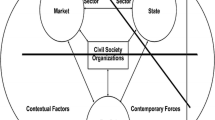Abstract
This study compared capitalist and socialist countries in measures of the physical quality of life (PQL), taking into account the level of economic development. The World Bank was the principal source of statistical data for 123 countries (97 percent of the world's population). PQL variables included: 1) indicators of health, health services, and nutrition (infant mortality rate, child death rate, life expectancy, population per physician, population per nursing person, and daily per capita calorie supply); 2) measures of education (adult literacy rate, enrollment in secondary education, and enrollment in higher education); and 3) a composite PQL index. Capitalist countries fell across the entire range of economic development (measured by gross national product per capita), while the socialist countries appeared at the low-income, lower-middle-income, and upper-middle-income levels. All PQL measures improved as economic development increased. In 28 of 30 comparisons between countries at similar levels of economic development, socialist countries showed more favorable PQL out-comes.
Similar content being viewed by others
Rights and permissions
About this article
Cite this article
Cereseto, S., Waitzkin, H. Economic Development, Political-Economic System, and the Physical Quality of Life. J Public Health Pol 9, 104–120 (1988). https://doi.org/10.2307/3342145
Published:
Issue Date:
DOI: https://doi.org/10.2307/3342145




